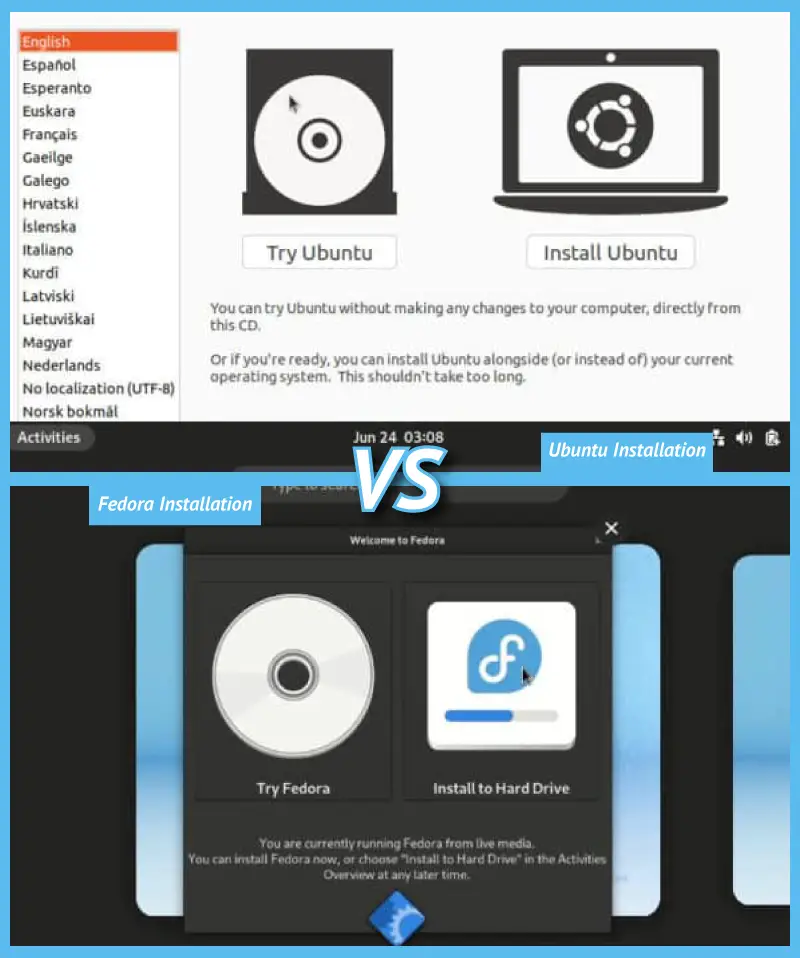Fedora and Ubuntu are regarded as powerhouses when selecting a Linux distribution. Both of these offerings cater well to the needs of developers and system administrators due to their comprehensiveness and stability. Deciding which of these two options is superior will rely on specific needs and preferences. So let’s compare Fedora and Ubuntu to help you make an informed decision.

Fedora: The Bleeding Edge

Fedora is known for staying at the forefront of software development, integrating the latest technologies and software versions. As a result, it’s ideal for users who crave the latest and greatest software. On the flip side, this can occasionally lead to stability issues, but the stability of Fedora remains high.

Fedora’s comprehensive package management system and support for Flatpak and RPM packages offer a vast array of software options. Moreover, Fedora’s focus on open source ensures that the operating system and its components remain free and open for all.
Ubuntu: Stability and Support
Ubuntu prioritizes stability and long-term support (LTS), making it an excellent choice for users seeking a stable, dependable operating system. Its LTS releases receive security and critical updates for five years, assuring a secure and stable experience throughout its support period.
Ubuntu’s vast software repository and user-friendly interface make it accessible to users of all skill levels. It’s particularly suitable for beginners and those seeking a hassle-free, out-of-the-box experience. The Ubuntu community is highly active and supportive, providing numerous resources and documentation.
Key Differences
- Release Cycle: Fedora follows a six-month release cycle with regular updates, while Ubuntu has a mix of regular and LTS releases with a two-year support period for non-LTS versions and five years for LTS versions.
- Software Freshness: Fedora provides newer software versions due to its focus on bleeding-edge technologies, while Ubuntu offers more stable and tested software versions.
- Package Management: Fedora uses DNF (Dandified Yum) and supports RPM and Flatpak packages, while Ubuntu utilizes APT (Advanced Package Tool) and supports DEB packages and Snap packages.
- Target Audience: Fedora is tailored toward developers, system administrators, and users who prefer the latest software, while Ubuntu caters to a broader audience, including beginners and those prioritizing stability.
Choosing Between Fedora and Ubuntu
Selecting between Fedora and Ubuntu hinges on individual preferences and requirements. If you seek the latest software and cutting-edge technologies, Fedora is the prime choice. If stability, long-term support, and user-friendliness are paramount, Ubuntu is the more suitable option.
Additionally, the choice may depend on your workflow and the software you intend to use. Consider reading user reviews, exploring online forums, and testing both distributions in virtual machines or live environments to make an informed decision.
Ultimately, both Fedora and Ubuntu are top-tier Linux distributions with distinct strengths and communities. The ideal choice for you will depend on your specific needs, preferences, and usage patterns.## Fedora Vs. Ubuntu: Workstation Wars
Executive Summary
Fedora and Ubuntu are two of the most popular Linux distributions for workstations. Both distributions have their own strengths and weaknesses, making them better suited for different types of users. In this article, we will compare Fedora and Ubuntu across various aspects to help you choose the best distribution for your needs.
Introduction
Linux distributions provide a wide range of choices for users, offering different features, tools, and desktop environments. Among the top contenders, Fedora and Ubuntu have established themselves as leading options for workstation setups. This article delves into the key differences between these two distributions to assist users in making an informed decision.
Package Management
Package management is a crucial aspect that determines the ease of installing and updating software on a system.
- Fedora: Uses DNF (Dandified Yum) as its package manager, which offers a powerful command-line interface and a comprehensive package repository.
- Ubuntu: Leverages APT (Advanced Packaging Tool), known for its user-friendly graphical interface, Synaptic Package Manager.
Desktop Environments
Both Fedora and Ubuntu offer multiple desktop environments to cater to different user preferences.
- Fedora: Provides GNOME as its default desktop environment, with alternatives like KDE Plasma and Xfce available.
- Ubuntu: Features GNOME as the default option, along with other choices such as KDE Plasma, Xfce, and Unity.
Systemd vs. Upstart
Systemd and Upstart are two different init systems responsible for managing boot-up and background processes.
- Fedora: Adopts Systemd as its init system, providing advanced features and improved performance.
- Ubuntu: Employs Upstart as its init system, which is simpler and has a smaller memory footprint.
Release Cycles
Release cycles influence the frequency of updates and potential stability issues.
- Fedora: Follows a rolling release model, delivering continuous updates and the latest software versions.
- Ubuntu: Adopts a fixed release cycle, releasing new versions every six months with long-term support (LTS) for specific versions.
Conclusion
Fedora and Ubuntu are both excellent choices for workstation setups, offering a range of features and user experiences. While they share some similarities, their differences in package management, desktop environments, init systems, and release cycles make them suitable for different user groups. By carefully considering the specific requirements of your workflow and preferences, you can choose the distribution that best aligns with your needs.
Keyword Phrase Tags
- Workstation Linux distributions
- Fedora vs. Ubuntu
- Package management: DNF vs. APT
- Desktop environments: GNOME vs. KDE Plasma
- Systemd vs. Upstart

I’ve been using Ubuntu for years as my primary workstation, and I’ve always been impressed with its stability and ease of use. However, I’ve recently been considering switching to Fedora, as I’ve heard great things about its performance and customization options.
Fedora is such a pain in the butt. I’ve tried using it several times, but I always end up going back to Ubuntu. The package management system is terrible, and the updates are always breaking my system.
Both Fedora and Ubuntu have their own strengths and weaknesses. Fedora is known for its cutting-edge features and customization options, while Ubuntu is known for its stability and ease of use. Ultimately, the best choice for you will depend on your individual needs and preferences.
I don’t know what all the fuss is about. Fedora is just a rebranded Red Hat Enterprise Linux, which is a server operating system. It’s not suitable for use as a desktop workstation.
The Fedora vs. Ubuntu debate is like the Coke vs. Pepsi debate. There’s no real right or wrong answer, it just depends on your personal preferences.
Oh, great. Just what we needed, another pointless comparison between two operating systems that are both essentially the same. Can’t we all just get along?
I’m not sure why anyone would choose Fedora over Ubuntu. Fedora is like a wild stallion that’s always trying to buck you off, while Ubuntu is like a trusty old horse that will get you where you need to go without any fuss.
I’ve used both Fedora and Ubuntu extensively, and I can say that Fedora is definitely the better choice for power users and those who want to customize their system. However, Ubuntu is a better choice for beginners and those who just want a system that works out of the box.
I’m a huge fan of Fedora. It’s the only operating system that I’ve ever used that truly feels like it was made for me. I love the customization options, the bleeding-edge software, and the amazing community.
I’m not convinced that Fedora is really that much better than Ubuntu. Sure, it has some nice features, but it’s also more unstable and difficult to use. I think Ubuntu is a better choice for most people.